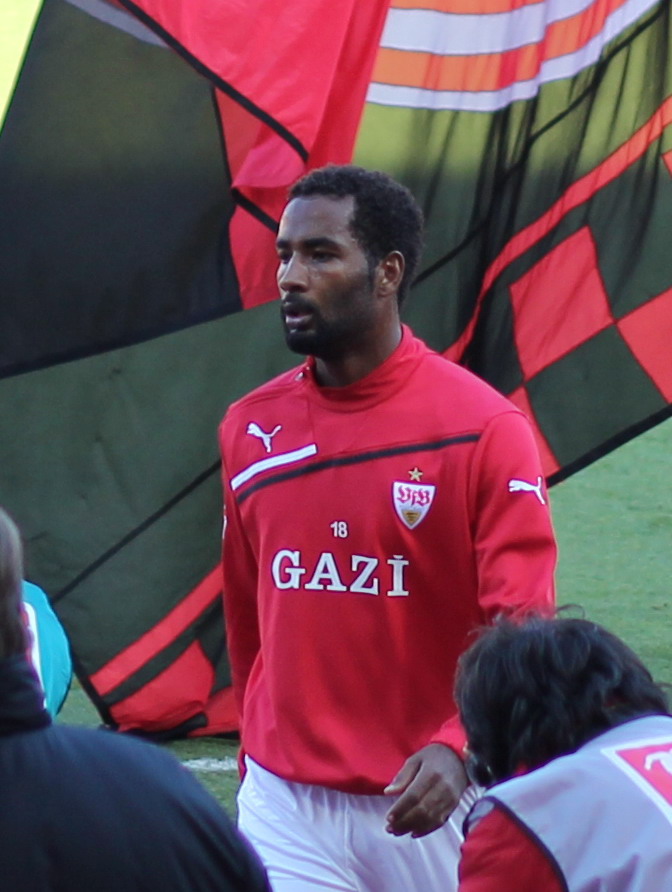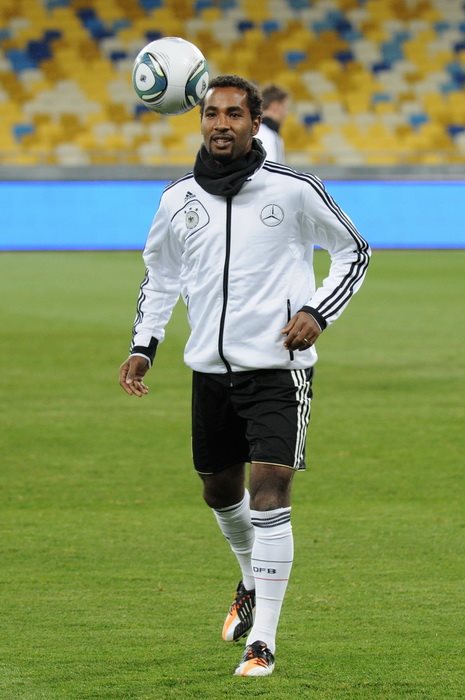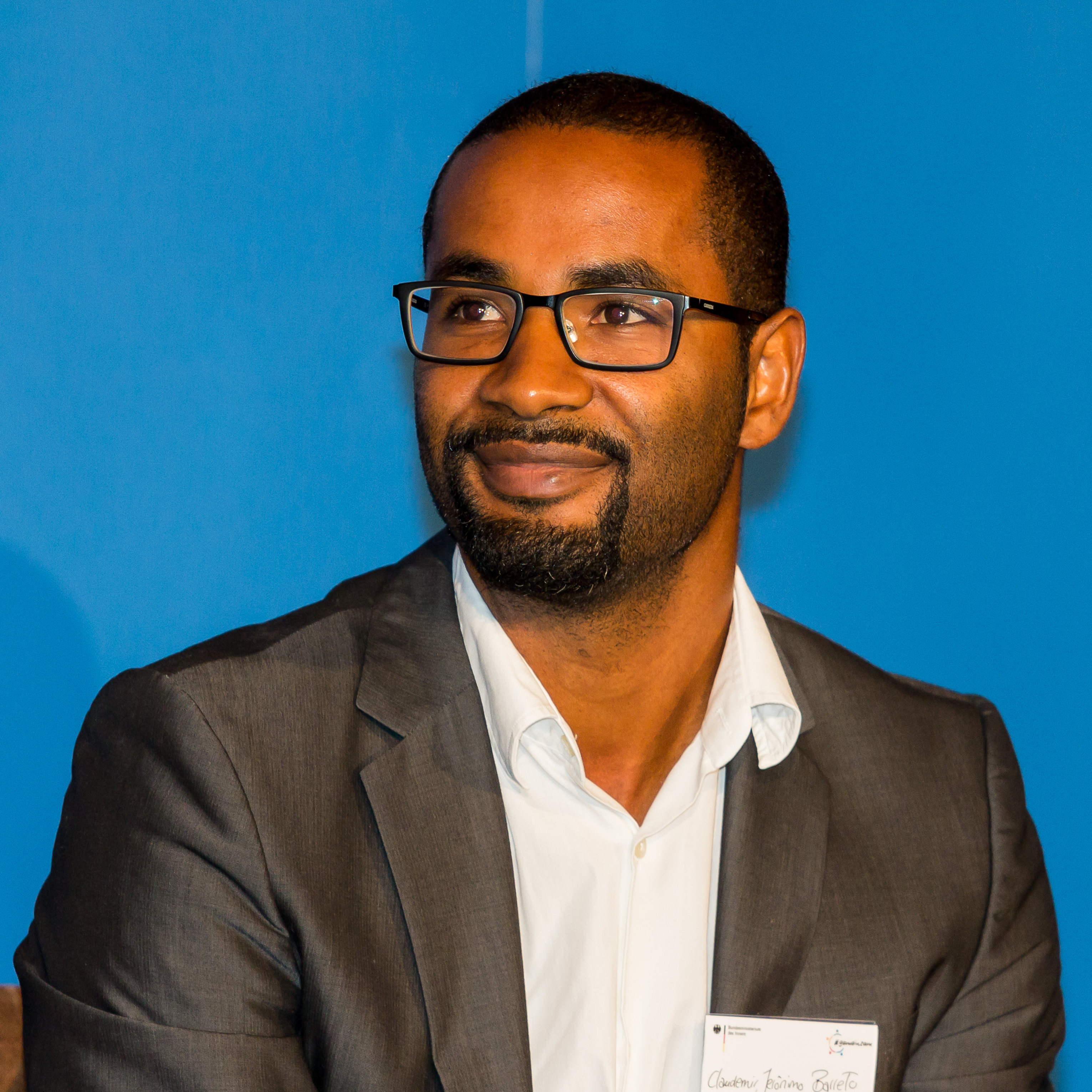1. Overview
Claudemir Jerônimo Barreto (born 27 March 1981), universally known as Cacau (kaˈkawkaˈkawPortuguese in Brazilian Portuguese; kaˈkaʊkaˈkaʊGerman in German), is a former professional footballer who primarily played as a striker. Born in Santo André, São Paulo, Brazil, Cacau notably became a naturalized German citizen in 2009 and went on to represent Germany at international level, including participating in the 2010 FIFA World Cup. His career, marked by significant contributions to VfB Stuttgart and a notable international transition, highlights themes of identity, integration, and the global nature of professional sports. Following his retirement from playing, he has continued his involvement in football as an ambassador for VfB Stuttgart, underscoring his lasting impact on the sport and the community.
2. Early life and youth career
Cacau's early life and formative years were shaped by his Brazilian roots, where he first developed his footballing talents before moving to Germany, a pivotal step in his career.
2.1. Birth and early development
Claudemir Jerônimo Barreto was born on 27 March 1981, in Santo André, São Paulo, Brazil. His early life in Brazil laid the foundation for his future football career.
2.2. Youth academy and early German clubs
Cacau began his youth football career in Brazil, joining the youth academy of SE Palmeiras from 1994 to 1997. He then moved to Nacional-SP, playing there from 1997 to 1999. After a brief period where he considered ending his playing career, Cacau moved to Germany in 2000 and resumed football with SV Türkgücü München. He spent the 2000-01 season with the fifth-division side, making 31 appearances and scoring 7 goals. Following his performances there, he joined 1. FC Nürnberg's reserve team in 2001, where his strong play quickly earned him a promotion to the senior squad.
3. Club career
Cacau's professional club career saw him play for several teams, most notably making a significant impact during his long tenure with VfB Stuttgart, where he achieved major success.
3.1. 1. FC Nürnberg
Cacau made his Bundesliga debut for 1. FC Nürnberg on 18 November 2001, against F.C. Hansa Rostock. In only his second Bundesliga match, on 8 December 2001, he scored two goals in Nürnberg's 4-2 defeat against Bayer 04 Leverkusen. He concluded his first Bundesliga season with 6 goals in 17 appearances. However, he struggled to replicate this success in the following 2002-03 season, scoring only 2 goals in 27 appearances, which coincided with Nürnberg's relegation from the top flight. Across his time with 1. FC Nürnberg, he played 44 matches and scored 8 goals in total.
3.2. VfB Stuttgart

Cacau joined VfB Stuttgart for the 2003-04 season, having already signed a contract in January 2003. In his debut season with Stuttgart, he made four appearances in the UEFA Champions League. During the 2004-05 season, he became the club's second-best goalscorer with 12 Bundesliga goals. He also had a successful UEFA Cup campaign, scoring three consecutive braces in Stuttgart's first three matches of the competition, and netting a total of 7 goals in 8 appearances.
The 2005-06 season was less successful for him, as he managed only four Bundesliga goals. However, in the 2006-07 season, Cacau emerged as one of the key players in Stuttgart's unexpected run to the Bundesliga title. He was again the club's second-best goalscorer with 13 goals, famously scoring both goals in a crucial 2-0 victory over Bayern Munich and the winning goal in a 3-2 away win against VfL Bochum during the final five rounds of the season. That same season, he also helped Stuttgart reach the final of the DFB-Pokal, scoring five goals in six matches. He opened the scoring in the final against his former team, Nürnberg, but was unfortunately sent off just 11 minutes later. Stuttgart went on to lose the final 3-2 after extra time.
In the 2007-08 season, Cacau made five more appearances in the UEFA Champions League, scoring his first goal in the competition with an equalizer in a 3-2 win against Rangers. He contributed 9 goals in 27 appearances as the club finished sixth in the Bundesliga. For the 2008-09 season, he scored 7 Bundesliga goals in 25 league matches, helping Stuttgart secure a third-place finish. His performance significantly improved under manager Markus Babbel.
On 20 February 2010, Cacau had a standout performance, scoring four goals in a 5-1 away victory against 1. FC Köln. This marked a strong second half of the 2009-10 season for him, as he scored 11 goals in the final 12 matches, helping Stuttgart climb to seventh place and secure a UEFA Europa League spot. On 1 May 2010, he extended his contract with VfB Stuttgart until the summer of 2013. He continued his good form into the 2011-12 Bundesliga campaign, scoring a header against Schalke 04 on 6 August 2011, contributing to a 3-0 win. On 22 March 2013, Cacau exercised a contract option, extending his stay with Stuttgart until June 2014. On 3 May 2014, it was announced that he would leave Stuttgart at the end of the 2013-14 season upon the expiration of his contract.
3.3. Cerezo Osaka
On 11 August 2014, Cacau transferred to the Japanese J.League club Cerezo Osaka. He was signed with the expectation that he would provide a significant boost to the team's scoring, which was struggling. He scored his first J.League goal on 23 September against Nagoya Grampus. Despite scoring 5 goals in 12 appearances in the J1 League, and an additional 2 goals in 12 appearances in the J2 League in 2015, the team ultimately faced relegation to J2. In an interview with *Kicker*, Cacau critically assessed that the J1 League was two to three classes below the Bundesliga in terms of physical play and tactical sophistication. On 9 June 2015, he was released from his contract with Cerezo Osaka earlier than the initial June end date.
3.4. Later career and retirement
After leaving Cerezo Osaka, Cacau remained without a club for a period. On 1 February 2016, he made a return to Stuttgart, joining VfB Stuttgart II, the club's second team, which competed in the 3. Liga (third division). His decision to play for the reserve team was driven by a desire to help them avoid relegation. He made 9 appearances and scored 3 goals during this period. Cacau officially announced his retirement from professional football on 11 October 2016, citing a lack of interesting offers for his continued career.
4. International career
Cacau's international career is particularly noteworthy due to his journey from being Brazilian-born to representing the German national team, a testament to his integration and contribution to German football.
4.1. Naturalization and national team debut
Despite being born in Brazil, Cacau was never called up to the Brazil national football team. After living and playing in Germany for over eight years, he became eligible to play for Germany and acquired a German passport in February 2009, making him a dual national.
On 19 May 2009, Cacau received his first call-up to the Germany national football team from coach Joachim Löw for friendly matches against China and the United Arab Emirates. He made his international debut on 29 May 2009, in Germany's 1-1 draw against China in Shanghai, playing 27 minutes as a substitute for Mario Gómez. Four days later, he also appeared in Germany's 7-2 victory against the UAE, playing the entire second half as a substitute for Lukas Podolski and providing an assist for Mario Gómez's third goal. He opened his scoring account for Germany on 13 May 2010, netting a brace in a 3-0 friendly win over Malta.
4.2. 2010 FIFA World Cup

Cacau was selected for the German national team squad for the 2010 FIFA World Cup in South Africa. He scored his first World Cup goal on 13 June 2010, in Germany's opening group stage match against Australia, coming on as a substitute and scoring within 1 minute and 52 seconds to make the score 4-0. He later received a yellow card for diving in the same match.
Following Miroslav Klose's red card in the game against Serbia, Cacau started against Ghana in the final group stage match, which Germany won 1-0. Although he did not score in this match, his presence was vital. In the third-place play-off match against Uruguay on 10 July, Cacau started for Germany and played until the 73rd minute, as Germany secured a 3-2 victory, finishing third in the tournament.
4.3. Subsequent appearances and UEFA Euro 2012 qualification
Cacau remained a regular call-up for Germany during the UEFA Euro 2012 qualifying campaign. He made four consecutive substitute appearances from the first match against Belgium to the fourth match against Kazakhstan. Although he did not score during the qualifiers, he continued to be a part of the squad, even being called up for a friendly match against his native Brazil in August 2011. He scored Germany's only goal in a 1-2 friendly loss to France on 29 February 2012. Despite being included in the 30-man preliminary squad for UEFA Euro 2012, Cacau was ultimately excluded from the final 23-man squad.
5. Personal life
Beyond the football pitch, Cacau's life is marked by strong family ties, deep personal convictions, and engagement in important social discussions related to his background.
5.1. Family and beliefs
Cacau has a brother, Vlademir, who is also a professional footballer and has played for clubs such as Paraná Clube. Cacau is a devout Christian, emphasizing that his faith is a very significant part of his life and identity.
5.2. Nickname and public engagement
Since acquiring German citizenship in early 2009, Cacau earned the nickname 'Helmut' among his teammates at VfB Stuttgart and later with the German national team. This nickname was given to him by his then-Swiss Stuttgart teammate, Ludovic Magnin, who playfully suggested that as a German citizen, Cacau should also have a proper German name.
In 2021, Cacau featured in the documentary Schwarze AdlerGerman (Black Eagles). This film explores the experiences of Black players in German professional football, addressing issues of racism and integration within the sport. His participation in such a documentary underscores his commitment to public discourse and social awareness regarding the challenges faced by minority athletes in Germany.
6. Post-retirement activities

After concluding his professional playing career, Cacau transitioned into an ambassadorial role for his former club, VfB Stuttgart. In this capacity, he represents the club at various events and engages with fans and stakeholders, leveraging his positive image and strong connection to the team.
7. Achievements and honours
Cacau enjoyed a successful career, accumulating both team triumphs and individual accolades.
VfB Stuttgart
- Bundesliga: 2006-07
- DFB-Pokal runner-up: 2006-07, 2012-13
Germany
- FIFA World Cup third place: 2010
Individual
- DFB-Pokal top goalscorer: 2006-07
8. Career statistics
Cacau's career statistics provide a comprehensive overview of his appearances and goals across his club and international career.
8.1. Club
| Club | Season | League | National cup | League cup | Continental | Total | ||||||
|---|---|---|---|---|---|---|---|---|---|---|---|---|
| Division | Apps | Goals | Apps | Goals | Apps | Goals | Apps | Goals | Apps | Goals | ||
| SV Türkgücü München | 2000-01 | Landesliga | 31 | 7 | - | - | - | 31 | 7 | |||
| 1. FC Nürnberg | 2001-02 | Bundesliga | 17 | 6 | 0 | 0 | - | - | 17 | 6 | ||
| 2002-03 | 27 | 2 | 2 | 0 | - | - | 29 | 2 | ||||
| Total | 44 | 8 | 2 | 0 | 0 | 0 | 0 | 0 | 46 | 8 | ||
| VfB Stuttgart | 2003-04 | Bundesliga | 16 | 4 | 3 | 1 | 1 | 0 | 4 | 0 | 24 | 5 |
| 2004-05 | 32 | 12 | 3 | 2 | 2 | 2 | 8 | 7 | 45 | 23 | ||
| 2005-06 | 20 | 4 | 1 | 1 | 3 | 0 | 5 | 0 | 29 | 5 | ||
| 2006-07 | 32 | 13 | 6 | 5 | - | - | 38 | 18 | ||||
| 2007-08 | 27 | 9 | 1 | 0 | 1 | 0 | 5 | 1 | 34 | 10 | ||
| 2008-09 | 25 | 7 | 1 | 1 | - | 6 | 0 | 32 | 8 | |||
| 2009-10 | 25 | 13 | 2 | 2 | - | 6 | 1 | 33 | 16 | |||
| 2010-11 | 27 | 8 | 2 | 2 | - | 7 | 1 | 36 | 11 | |||
| 2011-12 | 33 | 8 | 4 | 3 | - | - | 37 | 11 | ||||
| 2012-13 | 5 | 1 | 2 | 0 | - | 4 | 0 | 11 | 1 | |||
| 2013-14 | 21 | 1 | 2 | 0 | - | 4 | 0 | 27 | 1 | |||
| Total | 263 | 80 | 27 | 17 | 7 | 2 | 49 | 10 | 346 | 109 | ||
| Cerezo Osaka | 2014 | J1 League | 12 | 5 | 2 | 0 | 0 | 0 | - | 14 | 5 | |
| 2015 | J2 League | 12 | 2 | - | - | - | 12 | 2 | ||||
| VfB Stuttgart II | 2015-16 | 3. Liga | 9 | 3 | - | - | - | 9 | 3 | |||
| Career total | 371 | 105 | 31 | 17 | 7 | 2 | 49 | 10 | 458 | 134 | ||
8.2. International goals
Scores and results list Germany's goal tally first, score column indicates score after each Cacau goal.
| No. | Date | Venue | Opponent | Score | Result | Competition |
|---|---|---|---|---|---|---|
| 1 | 13 May 2010 | New Tivoli, Aachen, Germany | Malta | 1-0 | 3-0 | Friendly |
| 2 | 2-0 | |||||
| 3 | 29 May 2010 | Puskás Ferenc Stadium, Budapest, Hungary | Hungary | 3-0 | 3-0 | Friendly |
| 4 | 13 June 2010 | Moses Mabhida Stadium, Durban, South Africa | Australia | 4-0 | 4-0 | FIFA World Cup 2010 |
| 5 | 6 September 2011 | PGE Arena Gdańsk, Gdańsk, Poland | Poland | 2-2 | 2-2 | Friendly |
| 6 | 29 February 2012 | Weserstadion, Bremen, Germany | France | 1-2 | 1-2 | Friendly |